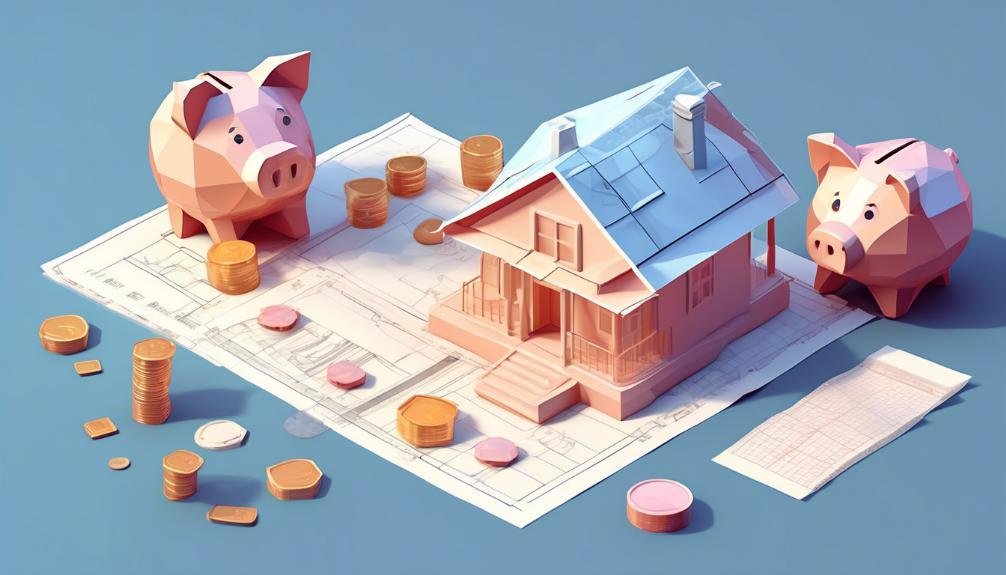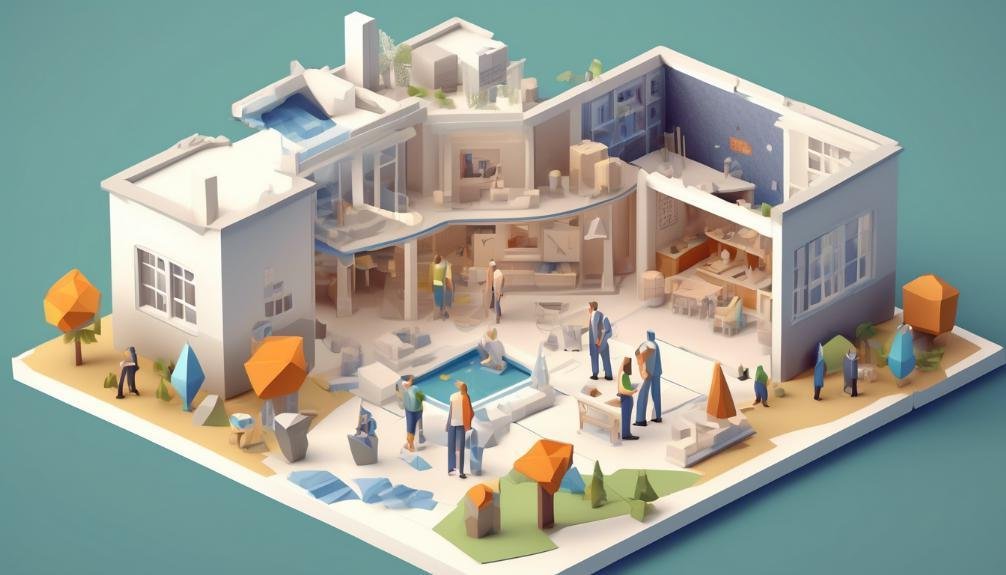When looking for your ideal home, it's important to know what you absolutely need versus what you can do without. This will help you stay within budget and find a home that meets your essential requirements. To figure out your must-haves, consider what features are non-negotiable for your lifestyle. For instance, if you work from home, a quiet office space might be a top priority. Or, if you love to cook, a spacious kitchen could be a must. It's also smart to think about the location. Do you need to be near certain schools or your workplace? Understanding these key elements will guide you in the home-buying process and lead you to a home that's a great fit for you. Remember, the goal is to find a place where you'll be happy and comfortable for years to come.
Assessing Financial Boundaries

Before you start looking for a house, it's important to figure out your budget. This helps you make smart choices about real estate. You want a house that you love, but it should also be a smart financial move. Many people buying their first home don't think about how much the house might be worth later on. Your home is more than just a place for your life's stories; it's also an investment that should grow in value over time.
First, get a clear idea of what you can really afford. This includes your mortgage, but also property taxes, insurance, upkeep, and other possible costs. Make sure you have enough money for both the things you plan for and the surprises.
To figure out if your home's value might go up, look at the location, the quality of local schools, and whether the neighborhood seems to be getting better. These things can change how much your home is worth in the future. Our team at Hometown Real Estate can help you think about these things. We're here to make sure that your purchase is a good choice for now and later. Be smart, be ready, and let's find a house that's right for you and your money.
Evaluating Location Preferences
Having set a budget, it's time to think about how the right location is key to a good home purchase. A good location isn't just about where you live—it shapes your day-to-day life and your future. It can affect the return on your investment and how happy you are with your home.
Think about how close the home is to your job, the quality of schools nearby, and what kind of shops and services are in the area. Do you prefer the quiet of the suburbs or the energy of the city? These choices will impact your daily routine, your children's education, and your free time.
Look into whether the area is likely to grow. If it is, your home's value might increase. If the neighborhood is already well-established, it might mean your home's value will stay stable.
Safety is crucial. Check the crime rates and talk to people living there to understand how safe it is. You're not just buying a house; you're also investing in feeling safe and secure.
When picking the right place, mix what you want with what's practical and look ahead. Listen to your gut, but also do your homework. The perfect spot for your new home combines your hopes with the facts to create the ideal living space.
Determining Space Requirements

When you're house hunting, it's important to think about how much room you'll need to live comfortably and whether the home can support any changes you might have planned for the future. Consider your current living space – is it too cramped, or do you find yourself wishing for a bigger kitchen or more closets? These thoughts can guide you in choosing the right size and layout for your new home.
The right amount of space isn't just about the total square footage. It's about how the home's design fits into your everyday activities. For example, an open floor plan could be great if you enjoy having friends over, but if you work from home, you might prefer a house with separate, quieter spaces. Keep in mind that every additional room means higher costs for buying, heating, cooling, and upkeep.
Think ahead about what your life might look like in the future. Maybe you're thinking about having kids, starting a business at home, or you often have guests stay over. It's better to consider these things now rather than having to remodel later or, even more inconvenient, having to move again.
At Your Hometown Real Estate, we've seen many people settle for a home that's too small, only to regret their decision later. We're here to help you strike the right balance between what you want and what you can afford, to make sure your new home is just right for the long term.
Prioritizing Essential Amenities
When looking for a new home, it's important to think about what features you really need. For example, if you work from home, you might want a dedicated office space. Energy-saving appliances could be a great choice if you want to cut down on bills and be kinder to the environment. And if you have a couple of cars, a two-car garage might be necessary.
Don't just think about the house itself—consider the area around it. Being close to parks, schools, and shops can make your life much easier. Make sure the things you're looking for are useful, not just fancy. A bathroom that feels like a spa or a professional-level kitchen can make everyday life better, so they might be worth spending on. But be careful not to get caught up in things that look good but aren't really useful in the long run.
Here at Your Hometown Real Estate, we suggest thinking carefully about what you want. Choose features that will be good for you now and in the future. This way, your new home won't just be a place to stay—it will be a place that fits your life perfectly.
Considering Future Plans

When you're in the market for a new house, think ahead about what your life might look like down the road. It's important to buy a home that not only works for you now but will also be suitable for the changes that could come your way. For instance, if you're thinking about having kids, you'll want a place with some extra rooms. Or, if you might end up working from home, a space that can be turned into a home office is a good idea. There might even be a chance that an elderly family member will need to move in, which would mean having a bedroom and bathroom on the first floor could be really helpful.
When searching for a home, keep these things in mind. Homes with spare rooms or areas that can be changed to fit your needs are a smart choice if family growth is in your plans. Jobs that offer the chance to work from home are more common, so having a room dedicated to an office is a big plus. Also, consider how easy it would be for older relatives to get around the house. And don't forget to think about how easy it would be to sell the house later on if you need to move.
In simple terms, buy a house with the future in mind. Look for places with extra space, office potential, and features that make life easier for everyone. This approach will help you enjoy your home for years to come and make a smart investment.
Understanding Property Conditions
When looking for a house, thinking about the future matters, but checking its current state is just as important. You need a house that works for you now and doesn't hide any costly problems. Pay attention to the essentials like the roof, foundations, wiring, and pipes. These parts can be expensive to fix if there's an issue, so it's best to know about them before you buy. A detailed inspection can help find any problems that aren't obvious at first glance. Think about how old the house is and when you might have to replace important parts.
It's easier to change the look of a house than to fix serious structural issues. When you visit a house, keep an eye out for signs that the house hasn't been looked after well, which might mean there are bigger issues. You should want a house that is not only nice to look at but is also strong and has been kept in good shape.
Here's an example: When checking a house, notice if the doors close properly or if there are cracks in the walls, which could suggest foundation problems. If you're not sure what to look for, consider hiring a professional inspector. They can give a full report on the house's condition and even suggest services like 'Safe & Sound Electric' for wiring checks or 'WaterWorks Plumbing' for pipe assessments.
Conclusion
As you picture your ideal home, bear in mind that finding a flawless property is highly unlikely. Be willing to adjust your list of essential features, as your initial desires may change when you start considering your budget. Listen to your instincts, be adaptable, and look for a house that feels right for beginning a new life stage. A home becomes special through the life you build in it, not just through its features.
For example, you might have a gourmet kitchen on your list, but if you find a home in a great location with a kitchen that has potential, consider whether you can make upgrades over time. It's also smart to think about the future; a home office might seem crucial now, but if the house has an extra bedroom, it can easily be converted later. Keep your focus on the things you can't change, like location and the number of bedrooms, and be flexible about what you can update or improve.

